Weiss Urban Livability Program
- The Fellowship Program
- About The Fellows
- Unique Learning Opportunities
- Weiss Urban Livability Library Collection
- Faculty Board
- Contact Us
The Fellowship Program
The Weiss Urban Livability Program supports talented graduate students who seek to improve urban livability. About eight fellowships are awarded annually to new graduate students in various disciplines at the University of North Carolina at Chapel Hill.
The one-year fellowship provides:
- Financial support
- Experience designing a community project
- Opportunities for support and growth
- Access to the Weiss Urban Livability Library Collection
This fellowship provides a stipend, tuition and health insurance for one year. Learn more about the funding.
If you are interested in being a Weiss fellow, learn more about how Fellows are selected.
2024-2025 Weiss Fellows
-
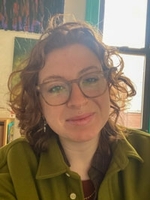 Ramana Housman, Clinical Rehabilitation and Mental Health Counseling, Senior Fellow — Ramana Housman is a second year student in the Clinical Rehabilitation and Mental Health Counseling masters program. They received their Bachelor of Science in Behavioral Neuroscience from Northeastern University and have extensive research and direct-care experience. Ramana is interested in pursuing a multifaceted career in clinical practice, research, and teaching. Through advocacy work, they hope to help address barriers that individuals with disabilities face in accessing meaningful vocation and community. Through clinical practice, they hope to serve the transgender, non-binary, and gender nonconforming community.
Ramana Housman, Clinical Rehabilitation and Mental Health Counseling, Senior Fellow — Ramana Housman is a second year student in the Clinical Rehabilitation and Mental Health Counseling masters program. They received their Bachelor of Science in Behavioral Neuroscience from Northeastern University and have extensive research and direct-care experience. Ramana is interested in pursuing a multifaceted career in clinical practice, research, and teaching. Through advocacy work, they hope to help address barriers that individuals with disabilities face in accessing meaningful vocation and community. Through clinical practice, they hope to serve the transgender, non-binary, and gender nonconforming community. -
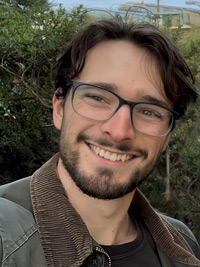 Jacob Abney, Environmental Sciences and Engineering — Jake Abney (he/him) is a first year master's student working in conjunction with Dr. Will Vizuete, Dr. Marc Serre, and Dr. Amanda Northcross as a part of the Environmental Sciences and Engineering Department. Originating from a background as a Chemical Engineering Graduate and as an Environmental Consultant, Jake's research interests are especially concerned with the health detriments posed on communities by industrial infrastructure, and hopes to champion shifting the narrative from an industry-first perspective to a community-first perspective. During his graduate career Jake also hopes to interact with undergraduates, cultivating discourse on topics of sustainability, as valuable experience for future professorship. As a prospective professor and researcher, his objective is to contribute his passion and dedication to a community of scholars empowering another generation of thinkers to engage in the frustrating, harrowing, and evasive injustices of their time.
Jacob Abney, Environmental Sciences and Engineering — Jake Abney (he/him) is a first year master's student working in conjunction with Dr. Will Vizuete, Dr. Marc Serre, and Dr. Amanda Northcross as a part of the Environmental Sciences and Engineering Department. Originating from a background as a Chemical Engineering Graduate and as an Environmental Consultant, Jake's research interests are especially concerned with the health detriments posed on communities by industrial infrastructure, and hopes to champion shifting the narrative from an industry-first perspective to a community-first perspective. During his graduate career Jake also hopes to interact with undergraduates, cultivating discourse on topics of sustainability, as valuable experience for future professorship. As a prospective professor and researcher, his objective is to contribute his passion and dedication to a community of scholars empowering another generation of thinkers to engage in the frustrating, harrowing, and evasive injustices of their time. -
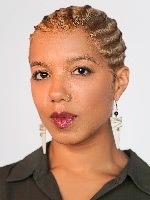 Aleta Brown, Education — Aleta Brown is an educator and movement artist who believes creativity is an essential component of liberatory education. Aleta has shared education research at NYU, Stanford University, Women United Against Genocide, and the NYC DOE. As a PhD student at UNC-Chapel Hill, Aleta's research interests include multimodal literacy strategies for multilingual students and arts-based research. Aleta is eager to continue researching and contributing to the fields of education and Urban Livability with the Weiss Fellowship at UNC Chapel Hill.
Aleta Brown, Education — Aleta Brown is an educator and movement artist who believes creativity is an essential component of liberatory education. Aleta has shared education research at NYU, Stanford University, Women United Against Genocide, and the NYC DOE. As a PhD student at UNC-Chapel Hill, Aleta's research interests include multimodal literacy strategies for multilingual students and arts-based research. Aleta is eager to continue researching and contributing to the fields of education and Urban Livability with the Weiss Fellowship at UNC Chapel Hill. -
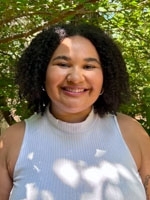 Sophia Chimbanda, Information and Library Science — Sophia Chimbanda is a first-year library and information science student. Her previous research experience has been on queer liberation activism in Durham in the late 1900s. She would like to continue to work on local history and preservation of queer justice movements while at Carolina. With her degree, Sophia hopes to utilize archival practices rooted in equity and care for people's stories, items, and experiences.
Sophia Chimbanda, Information and Library Science — Sophia Chimbanda is a first-year library and information science student. Her previous research experience has been on queer liberation activism in Durham in the late 1900s. She would like to continue to work on local history and preservation of queer justice movements while at Carolina. With her degree, Sophia hopes to utilize archival practices rooted in equity and care for people's stories, items, and experiences. -
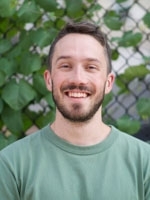 Ian Skahill, City & Regional Planning — I am pursuing a Master's in City and Regional Planning. I was born and raised in Philadelphia, where my interest in planning germinated. After majoring in Urban Studies as an Undergraduate, I worked in legal aid helping low-income Philadelphians defend their homes from foreclosure. For the past two years, I have lived in the town of Utrera in Southern Spain. I am excited to return to the world of housing, and hope to study strategies to foster equitable and affordable housing in today's cities.
Ian Skahill, City & Regional Planning — I am pursuing a Master's in City and Regional Planning. I was born and raised in Philadelphia, where my interest in planning germinated. After majoring in Urban Studies as an Undergraduate, I worked in legal aid helping low-income Philadelphians defend their homes from foreclosure. For the past two years, I have lived in the town of Utrera in Southern Spain. I am excited to return to the world of housing, and hope to study strategies to foster equitable and affordable housing in today's cities. 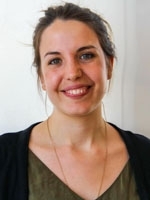 Lily Smith, Folklore — Lily began her career in the field of Workforce Development in NYC, helping run two job training programs for individuals with barriers to employment. For the past six years, she has worked as an electrician at a small company in Hillsborough, NC, where she has trained nine apprentices, over half of them women. Through the Master's of Folklore program, she plans to create a series of documentary films profiling women in the trades. She is interested in employment for underrepresented groups, vocational training, and traditional crafts/trades.
Lily Smith, Folklore — Lily began her career in the field of Workforce Development in NYC, helping run two job training programs for individuals with barriers to employment. For the past six years, she has worked as an electrician at a small company in Hillsborough, NC, where she has trained nine apprentices, over half of them women. Through the Master's of Folklore program, she plans to create a series of documentary films profiling women in the trades. She is interested in employment for underrepresented groups, vocational training, and traditional crafts/trades.-
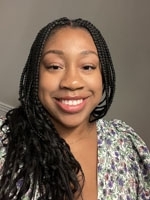 Kayla Roulhac, Geography — I am a first year PhD student in the Department of Geography and Environment. The focus of my research is areas of Black placemaking in the American South and the displacement from these areas, which was caused by Urban Renewal. I study the art created during this time, while also identifying its purpose as a form of celebration or resistance. Additionally, I evaluate the lasting impacts of Urban Renewal on the neighborhoods of focus, with the most common results being the loss of businesses and the creation of food deserts.
Kayla Roulhac, Geography — I am a first year PhD student in the Department of Geography and Environment. The focus of my research is areas of Black placemaking in the American South and the displacement from these areas, which was caused by Urban Renewal. I study the art created during this time, while also identifying its purpose as a form of celebration or resistance. Additionally, I evaluate the lasting impacts of Urban Renewal on the neighborhoods of focus, with the most common results being the loss of businesses and the creation of food deserts. 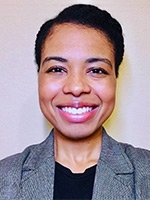 Jacqueline Zanders, Public Health — Jacqui is a third-year MD student at UNC Chapel Hill. She has an interest in outreach and service to patient populations with reduced access to healthcare, as well as to marginalized communities with heightened rates of mistrust in health care systems due to historical and contemporary injustices. Prior to attending UNC, she received a Bachelor's degree from Harvard University in Social Anthropology.
Jacqueline Zanders, Public Health — Jacqui is a third-year MD student at UNC Chapel Hill. She has an interest in outreach and service to patient populations with reduced access to healthcare, as well as to marginalized communities with heightened rates of mistrust in health care systems due to historical and contemporary injustices. Prior to attending UNC, she received a Bachelor's degree from Harvard University in Social Anthropology.
View earlier Weiss Fellows
Former Weiss fellows have come from disciplines as diverse as Studio Art, Religious Studies, Maternal and Child Health, and City and Regional Planning.
The Weiss Fellowship has guided graduate students toward careers serving the community. Examples of some careers that Weiss fellows have gone on to:
- City manager
- Public health doctor
- Water and sanitation engineer
- Community development leader
- Transportation planner
- Social worker
- Teacher
Unique Learning Opportunities
Community Project
A unique aspect of the program is the Community Project. Over the course of the year, Weiss fellows design a project to positively impact urban livability in their own community. Learn more about past community projects.
Seminar Series On Urban Livability
Through an ongoing seminar series, Weiss fellows meet regularly with people from the campus and community who study and work with issues relating to urban livability.
Mentoring
Fellows receive mentoring from senior faculty and a senior graduate fellow.
Inter-Disciplinary Collaboration
Fellows meet regularly to interact and collaborate on contemporary community issues.
When asked how the Weiss program impacted their lives, fellows remember:
- “I identify the Weiss fellowship as one of the great achievements of my life. It has given me an opportunity to learn about issues of urban livability and things that touch your heart.”
- “Interacting with the Weisses themselves and learning about the breadth and depth of their interests and accomplishments made me believe in the impact that individuals can have.”
- “Being a Weiss fellow reinforced the idea of using environmental knowledge to positively affect the human condition.”
Program History
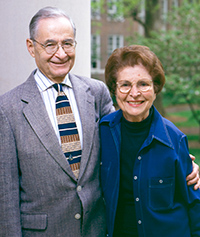
Charles and Shirley Weiss were retired professors of the University of North Carolina at Chapel Hill when they formed the idea for this innovative program. They designed the program to improve communities through interdisciplinary exploration of urban livability.
The Weisses’ active involvement with the arts, education and civic organizations, coupled with extensive world travel, convinced them that an interdisciplinary approach is essential to improving the quality of life in communities.
Believing that graduate students are an invaluable resource for the future, the Weisses created a program that supports and nurtures graduate students.
Weiss Urban Livability Library Collection
The Weiss Urban Livability Library Collection provides resources in order to stimulate and enlighten those interested in improving community life. The collection has over 300 volumes on urban livability. Topics range from the architecture of the city to the history of the environmental movement in the United States. This collection of books, monographs, articles and memorabilia is donated generously by the Weisses. It is currently housed in the Center for Urban and Regional Studies,
Faculty Board
A faculty board is composed of faculty from a range of departments across the university. These faculty members assist in selecting new fellows and providing program input each year.
- David Ansong, Social Work
- Bill Gentry, Public Health
- Nikhil Kaza, City & Regional Planning
- Rick Morse, Public Administration
- Roxana Perez-Mendez, Studio Art
- Kumi Silva, Communications
- Howard Weinberg, Environmental Sciences & Engineering
Contact Us
If you have questions, email gradfunding@unc.edu.
